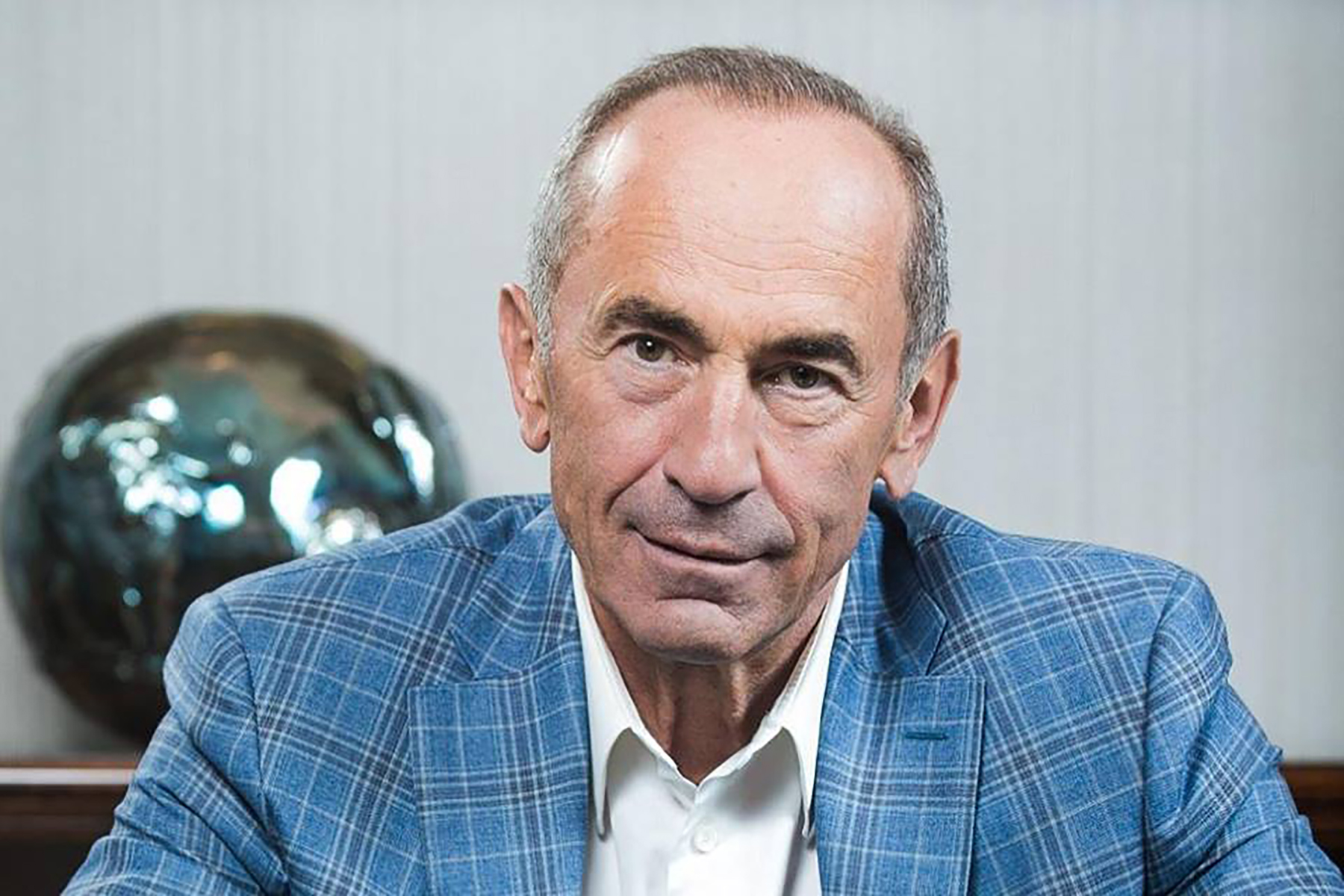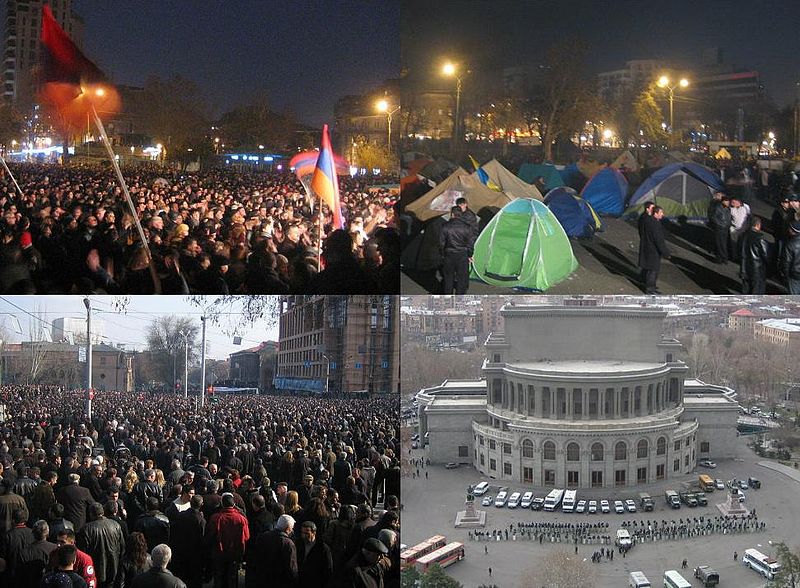

The trial of ex-President Robert Kocharyan, which began on 12 September, has been rocked by tumult with competing protests and the recent death of a key witness.
‘Kocharyan is a hero!’ chanted one group of protestors.
‘Kocharyan is a villain!’ chanted another.
It was a hectic scene outside of a Yerevan courthouse on 12 September, as supporters and opponents of Armenia’s second president Robert Kocharyan — who has been charged with ‘overturning the constitutional order — faced off. Meanwhile, inside the building, Armenia’s ‘trial of the century’ had finally begun.
The case is historic, and not just for Armenia. It is the first time the head of state of a post-Soviet country has been imprisoned on the basis of grave criminal charges
Kocharyan has been charged with ‘overthrowing constitutional order’ due to his alleged role in declaring martial law and ordering the violent dispersal of anti-government protest on 1 March 2008, which left 10 dead and over 100 injured. If he is convicted, he faces 10–15 years in prison.
A rocky road to trial
In the lead up to the trial, Kocharyan was released twice and arrested three times.
On 4 September, the Constitutional Court declared Kocharyan’s arrest ‘unlawful’, citing presidential immunity. Thereafter, Kocharyan’s lawyers announced that he should be released from custody immediately after this decision, however, the court declined.
On 9 September, the Prosecutor’s Office explained the court’s decision. In their response to Kocharyan’s lawyers, they stated that ‘there is no reason to stop the criminal prosecution brought against Robert Kocharyan by force of the decision of the Constitutional Court’.
‘The ex-president is not charged with an accusation of committing such actions that would be based on his [presidential] authority. The accusation does not concern his integrity, that is, the actions attributed to him cannot be considered as proceeding from his status [as president],’ the Prosecutor’s Office said in a statement.
The first of March
The president of the Union of Political Scientists of Armenia, Hmayak Hovhannisyan, told OC Media that he believes dealing with the ‘1 March case’ is of utmost importance for Armenia, to ensure that such a ‘bloody’ event is never repeated.

‘It is important not only to identify and punish those responsible for the killings but also those who ordered and organised them. Why? Because there should be a precedent for any government not to give such a command, and also a precedent that even if such power exists, ordinary soldiers or police officers would not follow such orders’, he said.
He added that ex-president Serzh Sargsyan, who was Armenia’s prime minister and president-elect on 1 March 2008, should also be punished.
‘As a result [of the events of 1 March] he himself became president. He was the acting prime minister and headed the interim headquarters […] which coordinated the punitive actions against demonstrators’, he said. ‘The members of this headquarters were high-ranking military men who are now being charged in the 1 March case.’
‘The case about the events [of] 1 March will be completely and entirely solved’, Armenian Prime Minister Nikol Pashinyan said in a speech delivered on 24 October 2018. ‘I urge everyone to be psychologically prepared for the case about the events of 1 March to be fully solved, because it will not be easy to learn everything that, I am sure, you will soon learn.’
Kocharyan has said he was innocent of the charges. He accuses those who were in opposition at that time, led by the first president of Armenia, Levon Ter-Petrosyan, of organising mass riots and being responsible for the deaths.
Nikol Pashinyan, was also among the opposition in 2008, was imprisoned from 2009–2011 after being convicted of ‘organising mass disorder’ for his alleged role in the events.
A contentious case
Hayk Alumyan, a member of Kocharyan’s legal team, told OC Media that the accusations against Kocharyan were false and completely politically motivated.
‘The content of the indictment is political, there is not even 1% of a legal component in it’, he said. ‘This is political persecution. [Declaring martial law] was permitted by law.’
Alumyan added that there was undue political pressure being put on the court.
‘Both the Prime Minister and the Speaker of the National Assembly openly stated that the decision of the Constitutional Court is not legal’, he said. ‘ If two senior officials in the country publicly state that the decision of the Constitutional Court is not legal, this, of course, puts pressure on the judge. It’s impossible to think of a more explicit and intense pressure.’
Seda Safaryan, a lawyer for one of the victims in the 1 March case told OC Media that she believes that ‘Robert Kocharyan’s prosecution is more than justified.’
‘[Robert Kocharyan] repeatedly violated the Constitution’, she said. ‘Articles 1–5 of the Constitution were clearly violated, people were prosecuted, the principle of separation of powers did not work, and a military dictatorship was established in Armenia.’
Safaryan insisted that if anyone was putting pressure on the court, it was not the new government but the former authorities. She pointed out that Kocharyan had already been released from custody twice, and that judges dealing with his case were previously appointed by these same authorities.
Lilit Galstyan, a member of the opposition Armenian Revolutionary Federation (ARF), told OC Media that ‘both sides have their share of responsibility in the 1 March conflict’.
‘The oppositional political force that organised the 2008 election campaign is also in the area of responsibility’, she added, saying that the degree of guilt on both sides should be presented to the public. According to Galstyan, ‘the court is one-sided today, and the court is under pressure’.
The ARF supported the government’s actions on 1 March and subsequently entered into a coalition with the ruling Republican party.
The Republican Party has claimed that Kocharyan is a political prisoner. The vice president of the party, Eduard Sharmazanov, told reporters on 11 September that ‘the Republican Party and I will support the struggle for the release of Robert Kocharyan and we will do everything to ensure that there are no political prisoners in Armenia and that this shameful regime will leave’.
The death of a witness
On 23 September, Hayk Harutyunyan was found dead with a gunshot wound to the head.
Harutyunyan served as chief of the Armenian Police from 2003–2008 and it was he who directed the initial suppression of protests on the morning of 1 March 2008. This provoked the much larger protest later that day which was then suppressed with deadly force.
Prosecutor General Arthur Davtyan told journalists that Harutyunyan’s death may be of key importance in the investigation, as he was a key witness.
So far the police have been treating Harutyunyan’s death as self-inflicted.
However, that has not stopped conspiracy theories spreading through social media. Many are convinced that Harutyunyan was murdered.
Gor Abrahamyan, Advisor to the Prosecutor General of Armenia, told OC Media that a comprehensive investigation is underway and that it will investigate all possibilities, ‘including the possibility of murder’.
According to the Prosecutor General, the Prosecutor’s Office does not have other materials related to Harutyunyan except for records of his interrogation.
Other defendants in the case include former Defence Minister Mikael Harutyunyan, who is currently in Russia, former Secretary-General of the Collective Security Treaty Organisation, Yuri Khachaturov, and former Minister of Defense Seyran Ohanyan.








